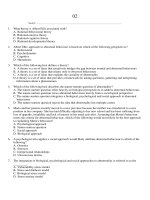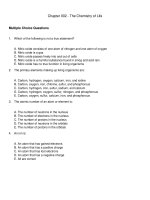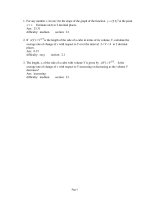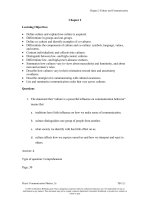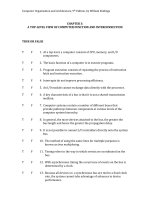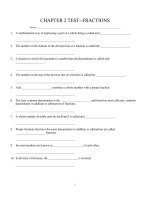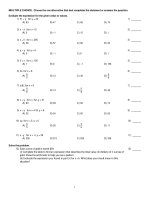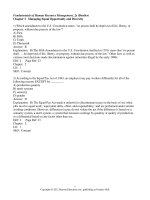M and f2 2nd edition david knox test bank
Bạn đang xem bản rút gọn của tài liệu. Xem và tải ngay bản đầy đủ của tài liệu tại đây (376.52 KB, 12 trang )
CHAPTER 2
GENDER
LEARNING OBJECTIVES
After reading this chapter, students should be able to:
1. Define and distinguish between the terms sex and gender, and other relevant
terminology.
2. Summarize and compare various theories of gender role development.
3. Discuss how the various agents of socialization influence gender role development.
4. Identify the positive and negative consequences of traditional female and traditional
male gender role socialization.
5. Discuss the concepts of androgyny, gender role transcendence, and gender post
modernism as they relate to the future of gender roles.
TEST QUESTIONS
Multiple Choice
1. The sex chromosomes of a normal woman are _________; of a normal man
___________.
a. XX; XY
b. YY; XY
c. XY; XX
d. XY; YY
ANS: a
PG: 32
OBJ: 2.1
2. An individual with mixed or ambiguous genitals is
a. homosexual.
b. intersexed.
c. bisexual.
d. transsexual.
ANS: b
PG: 32
OBJ: 2.1
3. What percent of births are of intersexed individuals?
a. 20 percent
b. 12 percent
c. 2 percent
d. There are no data to answer this question.
ANS: c
PG: 32
OBJ: 2.1
4. __________ refers to the biological distinction between females and males.
a. Sex
b. Gender
c. Gender role
d. Sexual orientation
ANS: a
PG: 31
OBJ: 2.1
5. The term “gender” refers to
a. biological characteristics.
b. social and psychological characteristics.
c. a transcendence of traditional roles.
d. hormonal differences.
ANS: b
PG: 32
OBJ: 2.1
6. Viewing yourself as a woman or a man is a reflection of your
a. sex.
b. gender.
c. gender identity.
d. sex role.
ANS: c
PG: 34
OBJ: 2.1
7. Gender dysphoria refers to which of the following?
a. a condition in which one’s gender identity does not match one’s biological sex
b. a condition in which a person has both male and female genitals
c. a condition in which a person exaggerates his or her gender characteristics
d. a condition in which a person exhibits both feminine and masculine personality traits
ANS: a
PG: 34
OBJ: 2.1
8. Gender roles are acquired through
a. socialization.
b. biological inheritance.
c. masculinity structures.
d. cognitive restructuring.
ANS: a
PG: 33
OBJ: 2.1
9. A dichotomous sex classification means that
a. heterosexual and homosexuals are recognized and treated as equals.
b. individuals are recognized as being primarily male or female.
c. men and women have dual androgynous qualities.
d. the sexes are born equal but sexism devalues and denigrates women.
ANS: b
PG: 32
OBJ: 2.1
10. Thomas Beatie is known as
a. the woman who could father a child.
b. the pregnant man.
c. the transgender poster child.
d. a gay transvestite.
ANS: b
PG: 34
OBJ: 2.1
11. Thomas Beatie, the pregnant man, is an example of
a. a transsexual female to male.
b. a cross-dresser.
c. a transsexual male to female.
d. an intersexed adult.
ANS: a
PG: 34
OBJ: 2.1
12. “I am a man trapped in a female body” is a feeling expressed by
a. a transsexual.
b. a cross-dresser.
c. an intersexed person.
d. an androgynous person.
ANS: a
PG: 34
OBJ: 2.1
13. Examples of ____________ include transsexuals, cross-dressers, and transvestites.
a. bisexuals
b. transgendered persons
c. gender identity
d. sexual scripts
ANS: b
PG: 34
OBJ: 2.1
14. These are the words of David Reimer who was a biological male but was reared as a girl.
a. “I was scammed.”
b. “I loved being a girl.”
c. “I was neither a girl nor a boy but always mixed sex.”
d. “No one asked about my sexual orientation but I’m gay.”
ANS: a
PG: 33
OBJ: 2.1
15. What percent of over 600 undergraduate females reported that they wanted to marry a
traditional man?
a. 60 percent
b. 5 percent
c. 30 percent
d. 85 percent
ANS: C
PG: 35
OBJ: 2.1
16. The point of Margaret Mead’s research of three tribes in New Guinea is that
a. human beings are mostly the result of their genetic wiring.
b. androgyny is more “natural” than either traditional or egalitarian roles.
c. intersexuality is present in all cultures.
d. culture constructs gender in different ways.
ANS: d
PG: 33
OBJ: 2.1
17. Which researcher was responsible for studying gender roles in three New Guinea tribes?
a. Erica Jong
b. Carl Sagan
c. Margaret Mead
d. Alfred Kinsey
ANS: c
PG: 33
OBJ: 2.1
18. Walzer (2008) noted that divorce “redoes” gender. By this, the researcher meant that
a. the genders become transitional and meet the definition of gender crossover.
b. women turn into breadwinners.
c. sex roles become more important than gender roles.
d. men abandon their father role.
ANS: b
PG: 35
OBJ: 2.1
19. “Undergraduate men are more likely to cheat if they think they won’t be caught” is
a. held by undergraduate women more than undergraduate men.
b. held by undergraduate men more than undergraduate women.
c. held by both undergraduate women and men.
d. held by neither undergraduate women nor men.
ANS: b
PG: 35
OBJ: 2.1
20. “Bars are good places to meet a potential partner” is a belief
a. held by undergraduate women more than undergraduate men.
b. held by undergraduate men more than undergraduate women.
c. held by both undergraduate women and men.
d. held by neither undergraduate women nor men.
ANS: b
PG: 35
OBJ: 2.1
21. “Love is a more important factor than age and race in choosing a mate” is a belief
a. held by undergraduate women more than undergraduate men.
b. held by undergraduate men more than undergraduate women.
c. held by both undergraduate women and men.
d. held by neither undergraduate women nor men.
ANS: a
PG: 35
OBJ: 2.1
22. A wet nurse, sperm donor, and child bearer are examples of
a. sexual identity.
b. gender identity.
c. sex role.
d. gender stereotype.
ANS: c
PG: 35
OBJ: 2.1
23. Which of the following is NOT a factor reflecting the parental investment of women?
a. nine months of gestation
b. taking care of dependent offspring
c. selecting high status men with economic resources
d. family of orientation
ANS: d
PG: 36
OBJ: 2.2
24. At what age does a child view gender as permanent?
a. very early (within the first year) because gender direction is innate
b. 3 to 4 years old
c. 6 to 7 years old
d. just before adolescence
ANS: c
PG: 37
OBJ: 2.2
25. Which theory emphasizes the evolutionary survival function of gender?
a. biosocial theory
b. cognitive developmental theory
c. social learning theory
d. identification theory
ANS: a
PG: 36
OBJ: 2.2
26. According to Freud, children acquire the characteristics and behaviors of their same-sex
parent through a process of
a. repression.
b. identification.
c. transference.
d. ideology.
ANS: b
PG: 37
OBJ: 2.2
27. A father who punishes his son for dressing like his mother reflects this gender theory.
a. social learning
b. cognitive developmental
c. sociobiological
d. identification
ANS: a
PG: 36
OBJ: 2.2
28. Which of the following theories of gender role development emphasizes that biological
readiness influences how the child responds to gender cues in the environment?
a. sociobiological
b. social learning
c. cognitive-developmental
d. identification
ANS: c
PG: 37
OBJ: 2.2
29. Four-year-old Mary tells her mother that she does not want her hair cut short because
then she will be a boy, and she does not want to be a boy. Which of the following
statements is true?
a. Mary is probably experiencing transgender issues.
b. Mary is gender aschematic.
c. Mary probably fears her father.
d. Mary does not understand gender as permanent.
ANS: d
PG: 37
OBJ: 2.2
30. African American families are stereotyped as being _________, but the more common
pattern is that they are _______________.
a. matriarchal; egalitarian
b. extended; restricted
c. abusive; God fearing
d. overpopulated; expanding horizontally
ANS: a
PG: 38
OBJ: 2.3
31. This person is a member of the fastest growing segment of the U.S. population.
a. African-America
b. Hispanic
c. Native-American
d. Alaskan
ANS: b
PG: 38
OBJ: 2.3
32. The more religious men are, the more likely they are to
a. adhere to traditional views of women.
b. accept women in leadership roles.
c. view women as their equal.
d. believe women are less sinful than men.
ANS: a
PG: 39
OBJ: 2.3
33. The fact that parents name their children Tom or Mary, dress them in pants or dresses,
and send out birth announcements as blue or pink reflects that the family is
a. a gendered institution.
b. a sexist institution.
c. an anachronistic institution.
d. an ahistorical institution.
ANS: a
PG: 38
OBJ: 2.3
34. When 9th grade children watch “romantic” TV (soaps, Lifetime movies) they are
a. more likely to develop egalitarian gender role attitudes.
b. more likely to develop traditional gender role attitudes.
c. more likely to develop tolerance for transgender people.
d. more likely to respect their parents.
ANS: b
PG: 40
OBJ: 2.3
35. Parents in the United States tend to
a. be more strict on male children.
b. be more strict on female children.
c. be equally strict on both children.
d. assign more chores to boys than girls.
ANS: b
PG: 38
OBJ: 2.3
36. The new gender revolution for boys would be that
a. money does not define masculinity.
b. feelings and relationships are important.
c. job success does not define the man.
d. men should be in control of relationships.
ANS: b
PG: 38
OBJ: 2.3
37. _________, such as parents, peers, religion, and education, shape the individual toward
various gender roles.
a. Agents of socialization
b. Role identifiers
c. Social forces
d. Cognitive-developmental models
ANS: a
PG: 37
OBJ: 2.3
38. The concentration of men and women in different occupations is called
a. the gender gap.
b. the work dichotomy.
c. occupational sex segregation.
d. the modern workplace.
ANS: c
PG: 39
OBJ: 2.3
39. Which of the following has contributed to occupational sex segregation?
a. gender dysphoria
b. traditional gender roles
c. modern, egalitarian gender role ideology
d. laws prohibiting discrimination on the basis of sex
ANS: b
PG: 39
OBJ: 2.3
40. According to Corra, et al., (2006), an analysis of General Social Survey data over a 30
year period, women reported _________ marital satisfaction than men.
a. lower
b. higher
c. the same
d. divided
ANS: a
PG: 42
OBJ: 2.4
41. Women are more likely to contract an STD or HIV from a man than vice versa because
a. women have more sexual partners than men.
b. women receive more body fluids from men than vice versa.
c. women feel less assertive than men when it comes to demanding condom use.
d. women are biologically weaker.
ANS: b
PG: 42
OBJ: 2.4
42. When men occupy an occupational role, it tends to
a. lower the status of the role.
b. create discrimination.
c. pay more.
d. pay less.
ANS: c
PG: 40
OBJ: 2.4
43. Which of the following is NOT one of the negative consequences of traditional female
role socialization?
a. income
b. life expectancy
c. feminization of poverty
d. marital satisfaction level
ANS: b
PG: 40
OBJ: 2.4
44. The disproportionate percentage of those living in poverty that includes women living
alone or with their children is called
a. the feminization of poverty.
b. the pink ghetto.
c. the old girls’ club.
d. financial genderization.
ANS: a
PG: 41
OBJ: 2.4
45. Positive consequences of traditional female role socialization include
a. life expectancy.
b. marital satisfaction.
c. benevolent sexism.
d. body image.
ANS: a
PG: 42
OBJ: 2.4
46. Negative consequences of traditional male role socialization include
a. life expectancy.
b. body image.
c. job discrimination.
d. marital satisfaction.
ANS: a
PG: 43
OBJ: 2.4
47. Reasons men are likely to have fewer friends than women include all EXCEPT
a. homophobia.
b. competition with other men.
c. fear of vulnerability.
d. no interest in friendship.
ANS: d
PG: 44
OBJ: 2.4
48. Ken likes to play football and cries at sad movies. He is
a. gender dysphoric.
b. androgynous.
c. gender neutral.
d. transgendered.
ANS: b
PG: 46
OBJ: 2.5
49. A person who aspires to be characterized as an androgynous person wants to
a. have traits that are neither masculine nor feminine.
b. end sexism and live in a world where women and men are equal.
c. live in a world where there is no longer a sexual double standard.
d. have a personality that reflects a blend of masculinity and femininity.
ANS: d
PG: 46
OBJ: 2.5
50. A person who has “transcended” gender roles is one who
a. can cry or be aggressive without regard to whether this is like a woman or man.
b. has succeeded in becoming like the other gender.
c. aspires to be androgynous.
d. prefers to be called a transgendered person.
ANS: a
PG: 47
OBJ: 2.5
51. _________ involves a blend of traits that are stereotypically associated with masculinity
and femininity.
a. Gender dysphoria
b. Androgyny
c. Gender role transference
d. S/he
ANS: b
PG: 46
OBJ: 2.5
52. Gender postmodernism calls for a new category (third sex) of people who
a. would be recognized as capable of many different identities.
b. would be intersexed.
c. would be biologically altered.
d. would capture the highest social position in society.
ANS: a
PG: 48
OBJ: 2.5
True-False
1. Women are more likely than men to believe that love is more important than race and
age in selecting a partner.
ANS: T
PG: 35
OBJ: 2.1
2. Men tend to see themselves (and women agree) as competitive, sarcastic, and sexual.
ANS: T
PG: 32
OBJ: 2.1
3. Biosocial theory emphasizes the importance of learning to the acquisition of gender
roles.
ANS: F
PG: 36
OBJ: 2.2
4. Maria and Steven attend church regularly. One prediction of their gender role ideology
is that they are traditional which is the gender role influence of religion.
ANS: T
PG: 39
OBJ: 2.3
5. The Roman Catholic Church has become a model of gender equality in that now almost
half of all clergy are female.
ANS: F
PG: 39
OBJ: 2.3
6. Recent data on prime television programs reveal that traditional scripting (e.g. men are
dominant and “need” sex; women are passive and valued for their bodies) is no longer
operative.
ANS: F
PG: 39
OBJ: 2.3
7. American females can expect to live longer than American males.
ANS: T
PG: 42
OBJ: 2.4
8. Women still earn about two thirds of what men earn.
ANS: T
PG: 40
OBJ: 2.4
9. Men are more likely to contract STDs and HIV from women than women are from men.
ANS: F
PG: 42
OBJ: 2.4
10. Androgynous people are individuals who want to have surgery to alter their genitals so
that they can become a member of the other sex.
ANS: F
PG: 46
OBJ: 2.5
11. Physiological androgyny refers to intersexed individuals.
ANS: T
PG: 46
OBJ: 2.5
Short Answer
1. Differentiate between the terms: sex, gender, gender role, gender role ideology and
transgenderism.
ANS: Will vary
PG: 31-36
OBJ: 2.1
2. What does it mean to be transgendered? What are the different ways to be
transgendered?
ANS: Will vary
PG: 34
OBJ: 2.1
3. Explain the idea that “biological sex may be viewed as existing on a continuum, rather
than as two discrete categories (male and female).”
ANS: Will vary
PG: 32
OBJ: 2.1
4. What is “parental investment” and which gender is likely to experience more of it?
ANS: Will vary
PG: 36
OBJ: 2.2
5. Use the biosocial framework to explain why women tend to select high status,
economically secure men to marry.
ANS: Will vary
PG: 36
OBJ: 2.2
6. Criticize the biosocial framework which suggests that women seek men with economic
resources.
ANS: Will vary
PG: 36
OBJ: 2.2
7. How does religion influence the development of traditional gender role
beliefs/attitudes?
ANS: Will vary
PG: 39
OBJ: 2.3
8. What is occupational sex segregation? Why does it occur?
ANS: Will vary
PG: 39
OBJ: 2.3
9. In what ways do males benefit from traditional gender socialization?
ANS: Will vary
PG: 45-46
OBJ: 2.4
10. Describe the concepts of gender role transcendence and gender postmodernism.
ANS: Will vary
PG: 46-47
OBJ: 2.5
Essay
1. Describe the case of David Reimer (the boy who was raised as a girl). Explain what is can
tell us about the development of gender identity.
ANS: Will vary
PG: 33
OBJ: 2.1
2. Compare and contrast the biosocial theory of gender development with the social
learning theory of gender development.
ANS: Will vary
PG: 36
OBJ: 2.2
3. Explain how greater parental investment of women influences their selection of a mate.
ANS: Will vary
PG: 36
OBJ: 2.2
4. Discuss and give examples of the ways in which the various agents of socialization (e.g.,
family, religion, etc.) influence the development of gender role attitudes and behaviors.
ANS: Will vary
PG: 37-44
OBJ: 2.3
5. Discuss the positive and negative consequences of traditional gender role socialization.
ANS: Will vary
PG: 40-44
OBJ: 2.4
